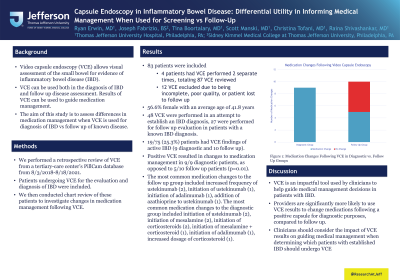Back


Poster Session D - Tuesday Morning
Category: IBD
D0347 - Capsule Endoscopy in Inflammatory Bowel Disease: Differential Utility in Informing Medical Management When Used for Screening vs Follow-Up
Tuesday, October 25, 2022
10:00 AM – 12:00 PM ET
Location: Crown Ballroom

Has Audio

Ryan Erwin, MD
Thomas Jefferson University Hospital
Philadelphia, PA
Presenting Author(s)
Ryan Erwin, MD1, Joseph Fabrizio, BS2, Tina Boortalary, MD1, Scott Manski, MD1, Christina Tofani, MD1, Raina Shivashankar, MD1
1Thomas Jefferson University Hospital, Philadelphia, PA; 2Sidney Kimmel Medical College at Thomas Jefferson University, Philadelphia, PA
Introduction: Video capsule endoscopy (VCE) can be used both in both the initial diagnosis of inflammatory bowel disease (IBD) and to follow-up disease activity. Results of VCE can be used to guide medication management. The aim of this study is to assess differences in medication management when VCE is used for diagnosis of IBD vs follow-up of known disease.
Methods: We performed a retrospective review of VCE using a tertiary-care center’s PillCam database from 8/3/2018-8/18/2021. Patients undergoing VCE for the evaluation and diagnosis of IBD were included. We then conducted chart review of these patients to investigate changes in medication management following VCE.
Results: A total of 83 patients were included in our study (56.6% female, average age 41.8 years [range 20-75 years]). Four patients had VCE performed 2 separate times, totaling 87 VCE reviewed. Twelve VCE were excluded from analysis due to being incomplete, poor quality, or patient was lost to follow up.
Of the remaining VCE, 48 were performed in an attempt to diagnose IBD and 27 were performed to reassess disease activity in patients with known IBD. VCE showed findings of active Crohn’s disease in 19/75 (25.3%) patients (9 diagnostic and 10 follow-up). Positive VCE resulted in medication changes in 9/9 diagnostic patients, as opposed to 5/10 follow up patients (p=0.01).
The most common medication changes to the follow-up group included dose escalation of ustekinumab (2), initiation of ustekinumab (1), initiation of adalimumab (1), addition of azathioprine to ustekinumab (1). The most common medication changes to the diagnostic group included initiation of ustekinumab (2), initiation of mesalamine (2), initiation of corticosteroids (2), initiation of mesalamine + corticosteroid (1), initiation of adalimumab (1), increased dosage of corticosteroid (1).
Discussion: VCE is an impactful tool used by clinicians to help guide medical management decisions in patients with IBD. Providers are significantly more likely to use VCE results to initiate medications following a positive capsule for diagnostic purposes when compared to a positive capsule to follow-up IBD activity. In the follow-up disease activity group, there may have been lower rates of new therapy initiation in favor of optimizing current medications. Further study in a larger cohort of patients would be important to confirm these findings.
Disclosures:
Ryan Erwin, MD1, Joseph Fabrizio, BS2, Tina Boortalary, MD1, Scott Manski, MD1, Christina Tofani, MD1, Raina Shivashankar, MD1. D0347 - Capsule Endoscopy in Inflammatory Bowel Disease: Differential Utility in Informing Medical Management When Used for Screening vs Follow-Up, ACG 2022 Annual Scientific Meeting Abstracts. Charlotte, NC: American College of Gastroenterology.
1Thomas Jefferson University Hospital, Philadelphia, PA; 2Sidney Kimmel Medical College at Thomas Jefferson University, Philadelphia, PA
Introduction: Video capsule endoscopy (VCE) can be used both in both the initial diagnosis of inflammatory bowel disease (IBD) and to follow-up disease activity. Results of VCE can be used to guide medication management. The aim of this study is to assess differences in medication management when VCE is used for diagnosis of IBD vs follow-up of known disease.
Methods: We performed a retrospective review of VCE using a tertiary-care center’s PillCam database from 8/3/2018-8/18/2021. Patients undergoing VCE for the evaluation and diagnosis of IBD were included. We then conducted chart review of these patients to investigate changes in medication management following VCE.
Results: A total of 83 patients were included in our study (56.6% female, average age 41.8 years [range 20-75 years]). Four patients had VCE performed 2 separate times, totaling 87 VCE reviewed. Twelve VCE were excluded from analysis due to being incomplete, poor quality, or patient was lost to follow up.
Of the remaining VCE, 48 were performed in an attempt to diagnose IBD and 27 were performed to reassess disease activity in patients with known IBD. VCE showed findings of active Crohn’s disease in 19/75 (25.3%) patients (9 diagnostic and 10 follow-up). Positive VCE resulted in medication changes in 9/9 diagnostic patients, as opposed to 5/10 follow up patients (p=0.01).
The most common medication changes to the follow-up group included dose escalation of ustekinumab (2), initiation of ustekinumab (1), initiation of adalimumab (1), addition of azathioprine to ustekinumab (1). The most common medication changes to the diagnostic group included initiation of ustekinumab (2), initiation of mesalamine (2), initiation of corticosteroids (2), initiation of mesalamine + corticosteroid (1), initiation of adalimumab (1), increased dosage of corticosteroid (1).
Discussion: VCE is an impactful tool used by clinicians to help guide medical management decisions in patients with IBD. Providers are significantly more likely to use VCE results to initiate medications following a positive capsule for diagnostic purposes when compared to a positive capsule to follow-up IBD activity. In the follow-up disease activity group, there may have been lower rates of new therapy initiation in favor of optimizing current medications. Further study in a larger cohort of patients would be important to confirm these findings.
Disclosures:
Ryan Erwin indicated no relevant financial relationships.
Joseph Fabrizio indicated no relevant financial relationships.
Tina Boortalary indicated no relevant financial relationships.
Scott Manski indicated no relevant financial relationships.
Christina Tofani indicated no relevant financial relationships.
Raina Shivashankar: Abbvie – Grant/Research Support, Speakers Bureau. Janssen – Advisory Committee/Board Member, Grant/Research Support.
Ryan Erwin, MD1, Joseph Fabrizio, BS2, Tina Boortalary, MD1, Scott Manski, MD1, Christina Tofani, MD1, Raina Shivashankar, MD1. D0347 - Capsule Endoscopy in Inflammatory Bowel Disease: Differential Utility in Informing Medical Management When Used for Screening vs Follow-Up, ACG 2022 Annual Scientific Meeting Abstracts. Charlotte, NC: American College of Gastroenterology.
